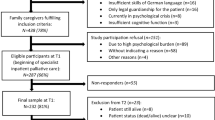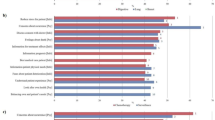Abstract
Purpose
Family caregivers (FCs) are crucial resources in caring for cancer patients at home. The aim of this investigation was (1) to measure the prevalence of unmet needs reported by FCs of cancer patients in home palliative care, and (2) to investigate whether their needs change as their socio-demographic characteristics and the patients’ functional abilities change.
Methods
FCs completed a battery of self-report questionnaires, including the Cancer Caregiving Tasks, Consequences, and Needs (CaTCoN).
Results
Data were collected from 251 FCs (74 men and 177 women, mean age 58.5 ± 14.2 years). Most of the participants experienced a substantial caregiving workload related to practical help (89.8%), provided some or a lot of personal care (73.1%), and psychological support (67.7%) to patients. More than half of the FCs reported that the patient’s disease caused them negative physical effects (62.7%). Emotional, psychosocial, and psychological needs were referred. Some FCs reported that the patient’s disease caused them a lot of stress (57.3%) and that they did not have enough time for friends/acquaintances (69.5%) and family (55.7%). The need to see a psychologist also emerged (44.0%). Age, caregiving duration, and patients’ functional status correlated with FCs’ unmet needs. Women reported more negative social, physical, and psychological consequences and a more frequent need to talk to a psychologist.
Conclusion
The analysis demonstrated that cancer caregiving is burdensome. The results can guide the development and implementation of tailored programs or support policies so that FCs can provide appropriate care to patients while preserving their own well-being.

Similar content being viewed by others
Data Availability
The datasets generated during and/or analyzed during the current study are available from the corresponding author on reasonable request.
Code availability
Not applicable.
References
Grov EK, Dahl AA, Fosså SD et al (2006) Global quality of life in primary caregivers of patients with cancer in palliative phase staying at home. Support Care Cancer. https://doi.org/10.1007/s00520-006-0026-9
Robison J, Fortinsky R, Kleppinger A et al (2009) A broader view of family caregiving: effects of caregiving and caregiver conditions on depressive symptoms, health, work, and social isolation. J Gerontol Ser B Psychol Sci Soc Sci 64B:788–798. https://doi.org/10.1093/geronb/gbp015
Ahmed S, Naqvi SF, Sinnarajah A et al (2020) Patient and caregiver experiences with advanced cancer care: a qualitative study informing the development of an early palliative care pathway. BMJ Support Palliat Care bmjspcare-2020-002578. https://doi.org/10.1136/bmjspcare-2020-002578
Zavagli V, Miglietta E, Varani S et al (2016) Associations between caregiving worries and psychophysical well-being. An investigation on home-cared cancer patients family caregivers. Support Care Cancer 24:857–863. https://doi.org/10.1007/s00520-015-2854-y
WHO (2020) Palliative Care - World Health Organization. https://www.who.int/news-room/fact-sheets/detail/palliative-care
Zavagli V, Raccichini M, Ercolani G et al (2019) Care for carers: an investigation on family caregivers’ needs, tasks, and experiences. Transl Med @ UniSa 19:54–59
Girgis A, Abernethy AP, Currow DC (2015) Caring at the end of life: do cancer caregivers differ from other caregivers? BMJ Support Palliat Care 5:513–517. https://doi.org/10.1136/bmjspcare-2013-000495
Sklenarova H, Krümpelmann A, Haun MW et al (2015) When do we need to care about the caregiver? Supportive care needs, anxiety, and depression among informal caregivers of patients with cancer and cancer survivors. Cancer 121:1513–1519. https://doi.org/10.1002/cncr.29223
Campbell HS, Sanson-Fisher R, Taylor-Brown J et al (2009) The cancer Support Person’s Unmet Needs Survey. Cancer 115:3351–3359. https://doi.org/10.1002/cncr.24386
Given BA, Given CW, Sherwood PR (2012) Family and caregiver needs over the course of the cancer trajectory. J Support Oncol 10:57–64. https://doi.org/10.1016/j.suponc.2011.10.003
Harding R, Epiphaniou E, Hamilton D et al (2012) What are the perceived needs and challenges of informal caregivers in home cancer palliative care? Qualitative data to construct a feasible psycho-educational intervention. Support Care Cancer 20:1975–1982. https://doi.org/10.1007/s00520-011-1300-z
Lambert SD, Harrison JD, Smith E et al (2012) The unmet needs of partners and caregivers of adults diagnosed with cancer: a systematic review. BMJ Support Palliat Care 2:224–230. https://doi.org/10.1136/bmjspcare-2012-000226
Ventura AD, Burney S, Brooker J et al (2014) Home-based palliative care: a systematic literature review of the self-reported unmet needs of patients and carers. Palliat Med 28:391–402. https://doi.org/10.1177/0269216313511141
Lund L, Ross L, Petersen MA, Groenvold M (2014) Cancer caregiving tasks and consequences and their associations with caregiver status and the caregiver’s relationship to the patient: a survey. BMC Cancer 14:541. https://doi.org/10.1186/1471-2407-14-541
Lund L, Ross L, Petersen MA, Groenvold M (2015) The interaction between informal cancer caregivers and health care professionals: a survey of caregivers’ experiences of problems and unmet needs. Support Care Cancer 23:1719–1733. https://doi.org/10.1007/s00520-014-2529-0
Hashemi M, Irajpour A, Taleghani F (2018) Caregivers needing care: the unmet needs of the family caregivers of end-of-life cancer patients. Support Care Cancer 26:759–766. https://doi.org/10.1007/s00520-017-3886-2
Chen SC, Chiou SC, Yu CJ, et al. (2016) The unmet supportive care needs—what advanced lung cancer patients’ caregivers need and related factors. Support Care Cancerhttps://doi.org/10.1007/s00520-016-3096-3
Park SM, Kim YJ, Kim S et al (2010) Impact of caregivers’ unmet needs for supportive care on quality of terminal cancer care delivered and caregiver’s workforce performance. Support Care Cancer 18:699–706. https://doi.org/10.1007/s00520-009-0668-5
Hudson P (2004) Positive aspects and challenges associated with caring for a dying relative at home. Int J Palliat Nurs 10:58–65. https://doi.org/10.12968/ijpn.2004.10.2.12454
Sharpe L, Butow P, Smith C et al (2005) The relationship between available support, unmet needs and caregiver burden in patients with advanced cancer and their carers. Psychooncology 14:102–114. https://doi.org/10.1002/pon.825
Jo S, Brazil K, Lohfeld L, Willison K (2007) Caregiving at the end of life: perspectives from spousal caregivers and care recipients. Palliat Support Care 5:11–17. https://doi.org/10.1017/S1478951507070034
Adejoh SO, Boele F, Akeju D et al (2021) The role, impact, and support of informal caregivers in the delivery of palliative care for patients with advanced cancer: a multi-country qualitative study. Palliat Med 35:552–562. https://doi.org/10.1177/0269216320974925
Bijnsdorp FM, Pasman HRW, Boot CRL et al (2020) Profiles of family caregivers of patients at the end of life at home: a Q-methodological study into family caregiver’ support needs. BMC Palliat Care 19:51. https://doi.org/10.1186/s12904-020-00560-x
Friðriksdóttir N, Sævarsdóttir Þ, Halfdánardóttir SÍ et al (2011) Family members of cancer patients: needs, quality of life and symptoms of anxiety and depression. Acta Oncol (Madr) 50:252–258. https://doi.org/10.3109/0284186X.2010.529821
Wang T, Molassiotis A, Chung BPM, Tan J-Y (2018) Unmet care needs of advanced cancer patients and their informal caregivers: a systematic review. BMC Palliat Care 17:96. https://doi.org/10.1186/s12904-018-0346-9
Casadio M, Biasco G, Abernethy A et al (2010) The National Tumor Association Foundation (ANT): a 30 year old model of home palliative care. BMC Palliat Care 9:12. https://doi.org/10.1186/1472-684X-9-12
Zavagli V, Raccichini M, Ostan R et al (2021) The ANT Home Care Model in Palliative and End-of-Life Care. An Investigation on Family Caregivers’ Satisfaction with the Services Provided. Transl Med UniSa 23:22. https://doi.org/10.37825/2239-9747.1022
Lund L, Ross L, Petersen MA et al (2020) Improving information to caregivers of cancer patients: the Herlev Hospital Empowerment of Relatives through More and Earlier information Supply (HERMES) randomized controlled trial. Support Care Cancer 28:939–950. https://doi.org/10.1007/s00520-019-04900-3
Lund L, Ross L, Petersen MA, Groenvold M (2014) The validity and reliability of the ‘Cancer Caregiving Tasks, Consequences and Needs Questionnaire’ (CaTCoN). Acta Oncol (Madr) 53:966–974. https://doi.org/10.3109/0284186X.2014.888496
Katz S, Downs TD, Cash HR, Grotz RC (1970) Progress in development of the index of ADL. Gerontologist 10:20–30. https://doi.org/10.1093/geront/10.1_Part_1.20
Wallace M, Shelkey M (2001) Katz Index of Independence in Activities of Daily Living. Home Healthc Nurse 19:323–324. https://doi.org/10.1097/00004045-200105000-00020
Lawton MP, Brody EM (1969) Assessment of older people: Self-maintaining and instrumental activities of daily living. Gerontologisthttps://doi.org/10.1093/geront/9.3_Part_1.179
Graf C (2008) The Lawton Instrumental Activities of Daily Living Scale. AJN, Am J Nurs 108:52–62. https://doi.org/10.1097/01.NAJ.0000314810.46029.74
Berardi R, Ballatore Z, Bacelli W et al (2015) Patient and caregiver needs in oncology. An Italian Survey. Tumori J 101:621–625. https://doi.org/10.5301/tj.5000362
Mosher CE, Adams RN, Helft PR et al (2016) Family caregiving challenges in advanced colorectal cancer: patient and caregiver perspectives. Support Care Cancer 24:2017–2024. https://doi.org/10.1007/s00520-015-2995-z
Beach SR, Schulz R (2017) Family caregiver factors associated with unmet needs for care of older adults. J Am Geriatr Soc 65:560–566. https://doi.org/10.1111/jgs.14547
Wong WKT, Ussher J, Perz J (2009) Strength through adversity: bereaved cancer carers’ accounts of rewards and personal growth from caring. Palliat Support Care 7:187–196. https://doi.org/10.1017/S1478951509000248
Palacio C, Limonero JT (2020) The relationship between the positive aspects of caring and the personal growth of caregivers of patients with advanced oncological illness. Support Care Cancer 28:3007–3013. https://doi.org/10.1007/s00520-019-05139-8
Cohen CA, Colantonio A, Vernich L (2002) Positive aspects of caregiving: rounding out the caregiver experience. Int J Geriatr Psychiatry 17:184–188. https://doi.org/10.1002/gps.561
Nouzari R, Najafi SS, Momennasab M (2019) Post-traumatic growth among family caregivers of cancer patients and its association with social support and hope. Int J Commun Based Nurs Midwifery 7:319–328. https://doi.org/10.30476/IJCBNM.2019.73959.0
ISTAT (2011) Caregiver: quanti sono, i dati ISTAT Caregivers: how many are there, ISTAT data. In: PMI. www.pmi.it/impresa/normativa/approfondimenti/149510/caregiver-quanti-i-dati-istat.html
Treanor CJ, Santin O, Prue G, et al. (2019) Psychosocial interventions for informal caregivers of people living with cancer. Cochrane Database Syst Revhttps://doi.org/10.1002/14651858.CD009912.pub2
Candy B, Jones L, Drake R, et al. (2011) Interventions for supporting informal caregivers of patients in the terminal phase of a disease. Cochrane Database Syst Revhttps://doi.org/10.1002/14651858.CD007617.pub2
Hudson P (2003) A conceptual model and key variables for guiding supportive interventions for family caregivers of people receiving palliative care. Palliat Support Care 1:353–365. https://doi.org/10.1017/S1478951503030426
Al Daken LI, Ahmad MM (2018) The implementation of mindfulness-based interventions and educational interventions to support family caregivers of patients with cancer: a systematic review. Perspect Psychiatr Care 54:441–452. https://doi.org/10.1111/ppc.12286
Acknowledgements
We would like to thank all the family caregivers that participated in the study. This work was possible only because they gave their time and shared their experiences with us.
Author information
Authors and Affiliations
Contributions
All the authors contributed to the study conception and design. Material preparation, data collection, and analysis were performed by Zavagli Veronica, Raccichini Melania, Ostan Rita, Ercolani Giacomo, and Franchini Luca. The first draft of the manuscript was written by Zavagli Veronica, and all the authors commented on previous versions of the manuscript. All the authors read and approved the final manuscript.
Corresponding author
Ethics declarations
Ethics approval
Approval was obtained from the ethics committee of Area Vasta Emilia Centro of Emilia-Romagna Region (CE-AVEC). All procedures were performed in accordance with the 1964 Helsinki Declaration and its later amendments.
Consent to participate
Informed written consent was obtained from all participants included in the study.
Consent for publication
Informed written consent was obtained from all participants included in the study.
Competing interests
The authors declare no competing interests.
Additional information
Publisher's note
Springer Nature remains neutral with regard to jurisdictional claims in published maps and institutional affiliations.
Rights and permissions
About this article
Cite this article
Zavagli, V., Raccichini, M., Ostan, R. et al. Identifying the prevalence of unmet supportive care needs among family caregivers of cancer patients: an Italian investigation on home palliative care setting. Support Care Cancer 30, 3451–3461 (2022). https://doi.org/10.1007/s00520-021-06655-2
Received:
Accepted:
Published:
Issue Date:
DOI: https://doi.org/10.1007/s00520-021-06655-2




